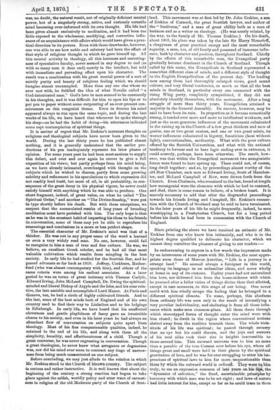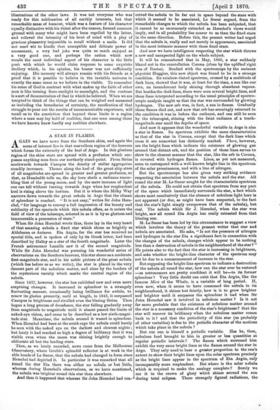Since printing the above we have 'received an estimate of
Mr. Erskine from one who knew him intimately, and who is in the highest degree qualified to delineate his character, which we cannot deny ourselves the pleasure of giving to our readers :- In endeavouring to express in a few words the impression made by an intercourse of some years with 'Mr. Erskine, the most appro- priate seem those of Marcus Aurelius, " Life is a journey in a strange land." He seemed always a foreigner in this world, speaking its language as an unfamiliar idiom, and never wholly at home in any of its customs. Eighty years had not naturalized him here, nor delivered him from the home-sickness with which he yearned after a fuller vision of things divine than that allotted, except in rare moments, to this stage of our being. One never could with him wholly escape the feeling that he belonged to a different spiritual climate. To some, perhaps, this aloofness from ordinary life was seen only in the result of intensifying a very peculiar individuality, and sheltering it from all those influ- ences which make men common-place. All those doors through which stereotyped forms of thought enter the mind were with him closed; he dwelt in the region where conventional notions shrivel away from the realities beneath them. The whole vicis- situde of his life was spiritual ; he passed through scenery that no eye but his could discern, and the joys and sorrows of his soul alike took their rise in heights inaccessible to those around him. This outward universe was to him no more than a parable of the true Cosmos ever before his eye, where all things great and small were held in their places by the spiritual gravitation of love, and he was for ever straggling to utter his im- pressions of spiritual laws to him far more unquestionable than those by which the outward world is ordered.. They were to him traly, to use an expression common of late years• on his lips, the " dynamics of salvation," the fixed, ascertainable principles by harmony with which man was to be set right ; and laws ,of nature had little interest for him, except so far as he could trace in them
illustrations of the other laws. It was not everyone who was ready for this sublimation of all earthly interests, but that remarkable sense of humour, which was a feature of his character equally distinctive with his thirst after the unseen, formed common ground with many who might have been repelled by the latter, and relieved the intensity of his bent of mind with a play of gracious pleasantry impossible to recall without a smile. It did not need wit to kindle that susceptible and delicate power of amusement, a very bid joke was quite as much enjoyed as a very good one, and perhaps the action which now recalls the most individual aspect of his character is the little push with which he would claim response to some exquisite drollery which, in his opinion, his hearer was not sufficiently enjoying. His memory will always remain with his friends as a proof that it is possible to believe in the invisible universe in exactly the same sense as we believe in the visible. To remember his sense of God in contrast with what makes up the faith of other men is like turning from sunlight to moonlight, and the contrast is a sort of demonstration of that in which he believed. When we are tempted to think of the things that can be weighed and measured as including the boundaries of certainty, the recollection of that struggle to pour out the results of incommunicable experience, will recall us to the conviction that beyond these limits is a region where a man may lay hold of realities, that one man among those we have known knew hardly any realities elsewhere.



































 Previous page
Previous page